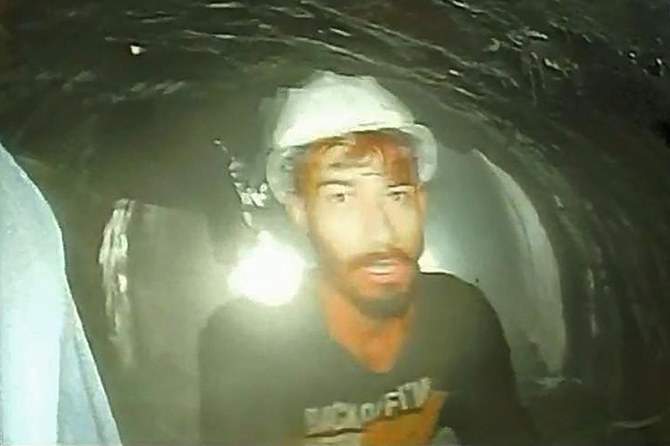DEHRADUN, India: Forty-one Indian workers trapped in a collapsed road tunnel for 10 days were seen alive on camera for the first time Tuesday as workers attempted to create new passageways to free them.
One of the proposed routes is nearly half a kilometer (over a quarter of a mile) long.
Looking exhausted and anxious, with thick beards, the men could be seen peering at the endoscopic camera sent by rescuers down the thin pipe through which air, food and water are being sent.
“We will bring you out safely, do not worry,” rescuers can be heard telling the helmet-wearing men trapped inside as they gather near the camera, video released by state authorities shows.
Excavators have been removing tons of earth, concrete and rubble from the under-construction tunnel in the northern Himalayan state of Uttarakhand since November 12, after a portion of the tunnel collapsed.
But rescue efforts have been slow, complicated by falling debris as well as repeated breakdowns of crucial heavy drilling machines, with the air force having to twice airlift in new kit.
Before the camera was introduced, rescuers had been communicating with the men inside using radios.
“All the workers are completely safe,” Uttarakhand chief minister Pushkar Singh Dhami said in a statement. “We are trying with all our might to get them out safely soon.”
Dhami said he had spoken to Prime Minister Narendra Modi about the men, adding Modi told him it had to be their “top priority” to get the workers out.
Engineers had been trying to horizontally drive a steel pipe just wide enough for the increasingly desperate men through at least 57 meters (187 feet) of earth and rock that block their escape.
But the giant earth-boring machine they were using ran into boulders it could not get through.
Drilling on that route was paused on Friday after a cracking sound created a “panic situation,” officials said.
Rescue teams are now preparing two new approaches to reach the men.
One is drilling a vertical shaft down from the forested hill above, forcing workers to cut an entirely new track to the top for the heavy equipment needed.
Officials estimated the proposed vertical shaft would need to be 89 meters (291 feet) deep, a potentially complex dig above the men in an area that has already suffered a collapse.
The other is to approach from the far side of the road tunnel, a far longer route of more than 450 meters, according to Indian media reports.
The tube used to deliver supplies to the men was successfully widened on Monday with the installation of a 15-centimeter (six-inch) pipe, through which the camera was sent down.
It is hoped that a drone can also be sent down to assess the stability of the area where the men are trapped.
Hot meals were also delivered through the new pipe for the first time.
“We have sent 24 bottles with meals and bananas to the trapped workers,” top local civil servant Abhishek Ruhela said.
Experts have warned about the impact of extensive construction in Uttarakhand, where large parts of the state are prone to landslides.
The planned 4.5-kilometer tunnel is part of Modi’s infrastructure plans aimed at cutting travel times between some of the most popular Hindu sites in the country, as well as improving access to strategic areas bordering rival China.
Foreign experts have been drafted in, including Australian independent disaster investigator Arnold Dix, president of the International Tunnelling and Underground Space Association.
“Those 41 men are coming home,” Dix told the Press Trust of India news agency. “Exactly when? Not sure.”


Indian workers trapped in tunnel for 10 days seen on camera
Short Url
https://arab.news/7nnqy
Indian workers trapped in tunnel for 10 days seen on camera

- Excavators have been removing tons of earth, concrete and rubble from the under-construction tunnel since November 12
- Rescue teams are now preparing two new approaches to reach the men
Column of smoke seen, loud noises heard in Venezuelan capital
Airplanes, loud noises and at least one column of smoke were being heard and seen in Venezuelan capital Caracas in the early hours of Saturday morning, according to Reuters witnesses, and the southern area of the city, near a major military base, was without electricity.
US President Donald Trump has repeatedly promised land operations in Venezuela, amid efforts to pressure President Nicolas Maduro to leave office, including expanded sanctions, a ramped-up US military presence in the region and more than two dozen strikes on vessels allegedly involved in trafficking drugs in the Pacific Ocean and Caribbean Sea.
The Pentagon did not immediately respond to request for comment.
US President Donald Trump has repeatedly promised land operations in Venezuela, amid efforts to pressure President Nicolas Maduro to leave office, including expanded sanctions, a ramped-up US military presence in the region and more than two dozen strikes on vessels allegedly involved in trafficking drugs in the Pacific Ocean and Caribbean Sea.
The Pentagon did not immediately respond to request for comment.
© 2026 SAUDI RESEARCH & PUBLISHING COMPANY, All Rights Reserved And subject to Terms of Use Agreement.












